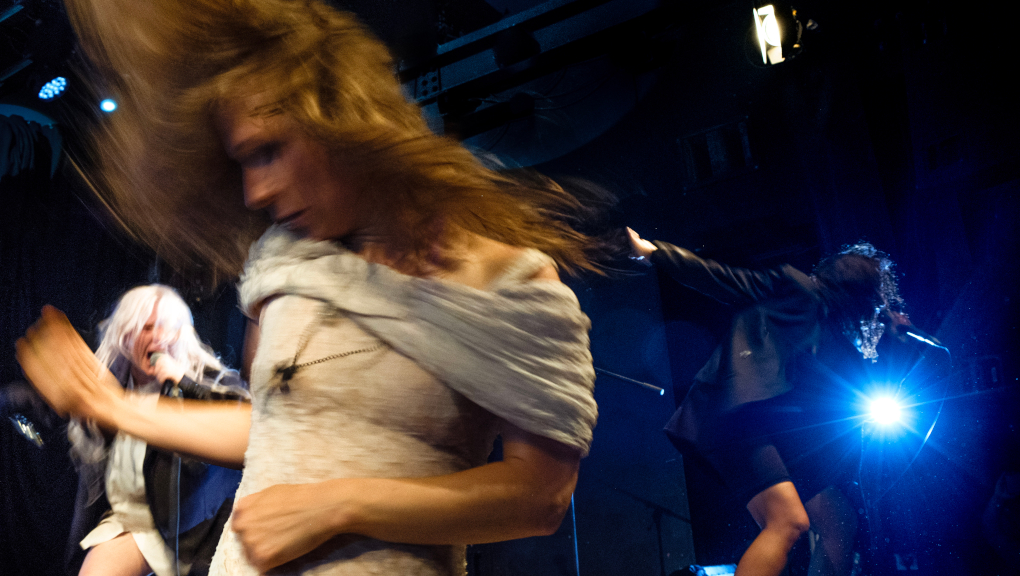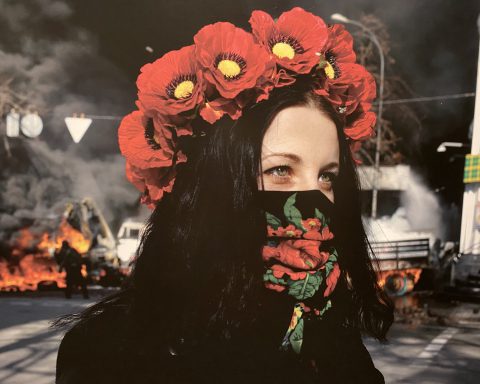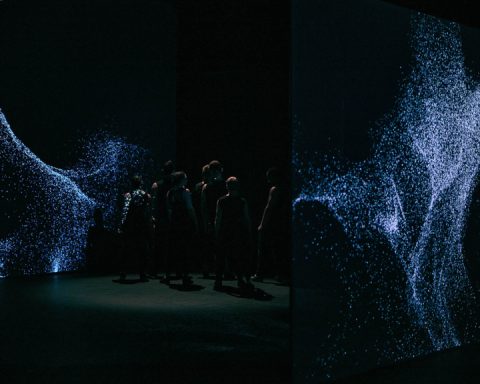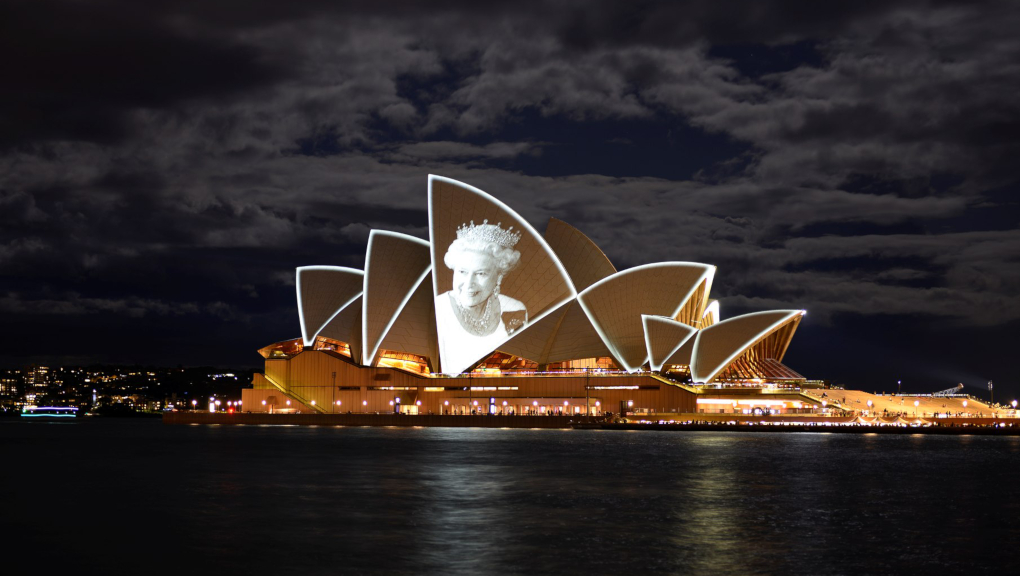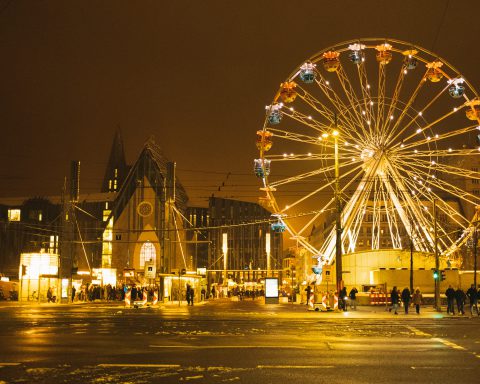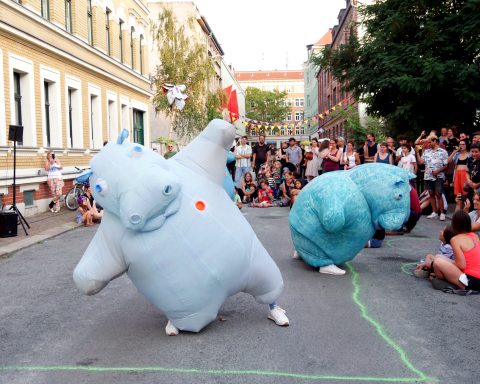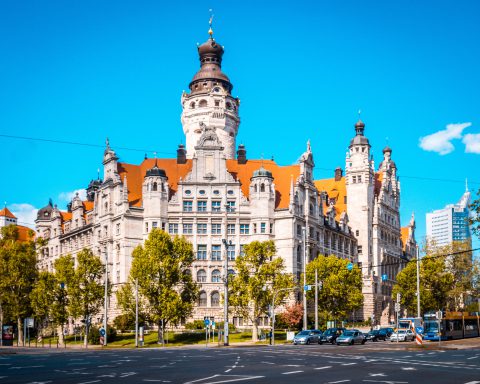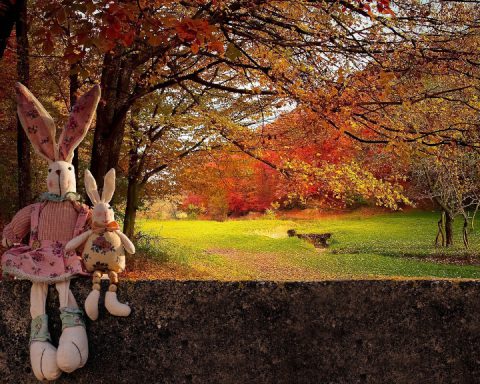How does one describe a Pussy Riot performance? Music? Theatre? Activism? Art?
Curiosity led a select public to their intimate concert at Täubchenthal in Leipzig on Friday night. Some, perhaps, in the hope of answering that question. The latest Pussy Riot mixed tape released out of the States is “Matriarchy Now“. Anyone expecting to be entertained in the same feel-good tone was in for a rude awakening. This is the “Riot Days” show, by the European arm of the Pussy Riot art collective.
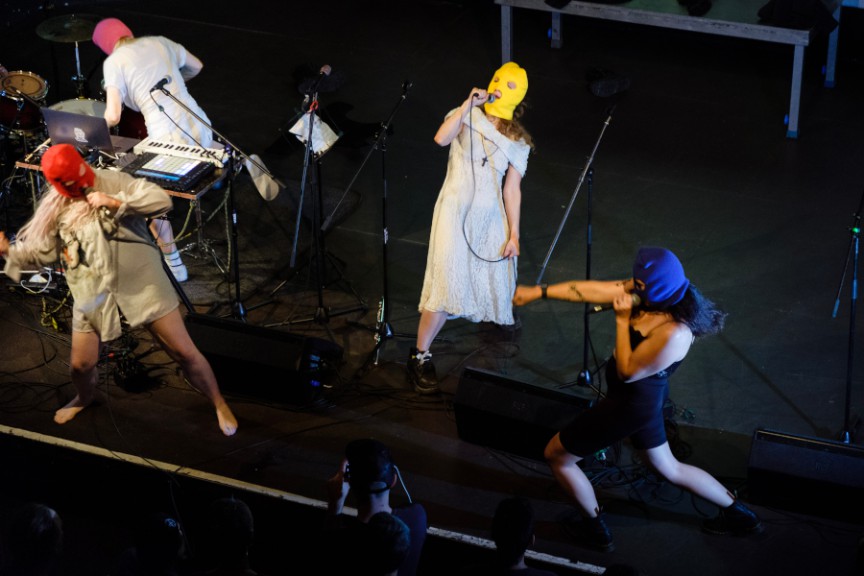
Riot Days is based on Maria (Masha) Alyokhina’s book of the same title, which was edited by fellow frontwoman, Olga Borisova. More akin to theatre than music, the performance tells Masha’s story. From her participation in the public protest in Moscow’s Cathedral of Christ the Savior in 2012 for which the group gained international notoriety, to her court hearing, transportation, and subsequent two-year incarceration in Siberia.
Even the Russian government admitted that it was difficult finding a reason to imprison Masha.
She had technically not broken any law during the protest, but they did it anyway, reason or not. In fact, Masha would still be under house arrest in Moscow had she not escaped, jail-bird style. She cut the digital tracker off her ankle and disguised herself as an Uber eats delivery driver, thus successfully escaping to the safety of Western Europe.
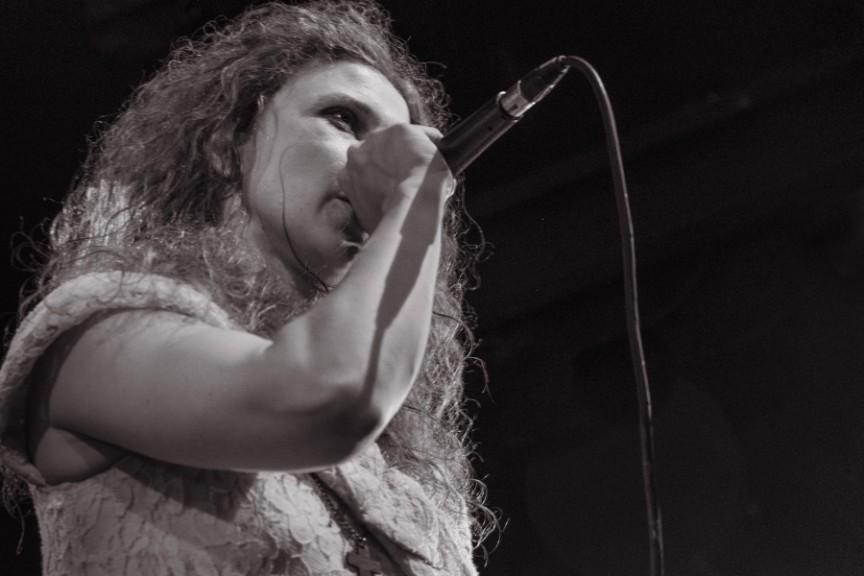
Thanks to her courage and cunning she now stands here on our stage in Leipzig. Once the epicenter of the 1989 Peaceful Revolution that reverberated out across Europe. Leading to the collapse of the USSR and the subsequent tearing down of the Berlin wall. Leipzig is at Masha Alyokhina’s feet tonight. The whole setting for this concert is pregnant with meaning.
There is a fearlessness in these women.
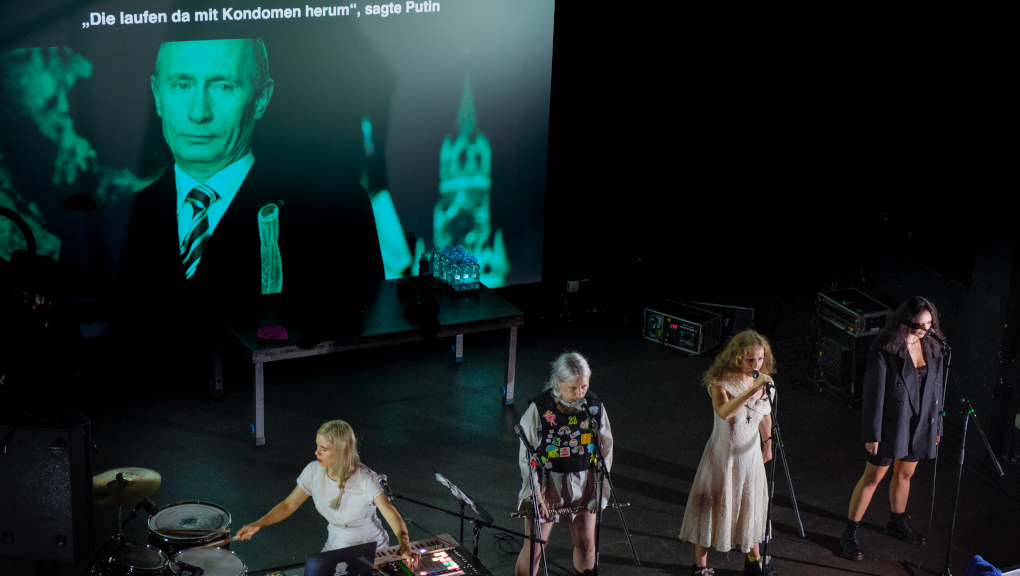
We live in a world where an angry man has something to say but an angry woman is branded as hysterical. These women are angry, loud, and certainly have something to say. Anyone who brands them as hysterical isn’t listening.
Their punk style of music reminds me of the concept of Dadaism, which flourished in Europe during the early 20th century. Dadaism uses simple forms of expression, forming a new language to obtain a voice where you have none because normal speech is not heard. It is a form of expression born out of helplessness. Reducing music to a simple form in order to communicate a clear and otherwise uncommunicable message. If all women in Russia were to begin behaving like Pussy Riot there would no longer be a need for Dadaistic expression. But when you are a small vanishing group in your own country, there is a need for extreme forms of expression. A need to cry out.
Masha and Olga half-spoke, half-yelled Masha’s story in Russian into microphones.
Masha turns her back on the crowd to face the images of her transportation and imprisonment being projected onto the wall behind her. She stands, legs apart, grounded and stable, pouring bottle after bottle of water over her own head. Simultaneously, Olga takes bottle after bottle and splashes them violently over the crowd as if to say, “Her suffering is our suffering.” Once again, Olga translates Masha’s story into a language all of us can relate to.
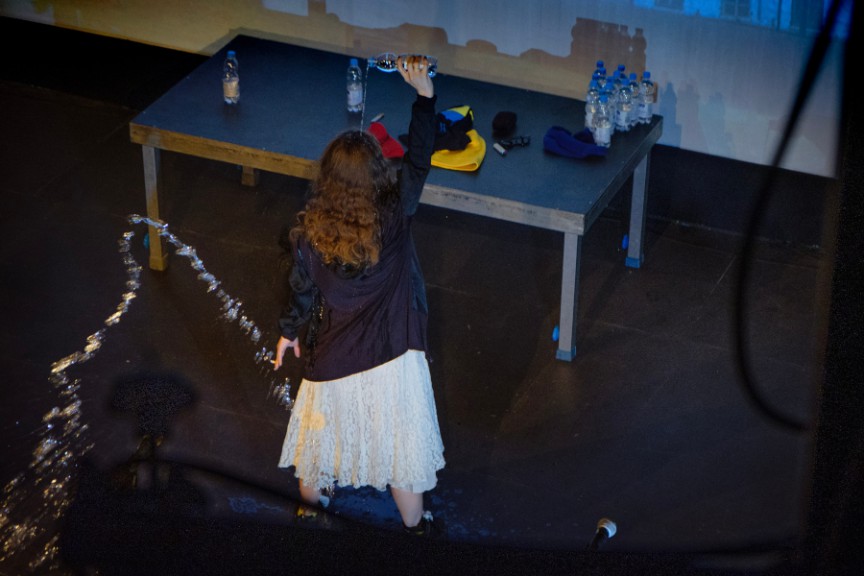
Parts of the show were hard to follow, most likely due to our lack of Russian rather than an inability to convey it on their part. German subtitles of the spoken words were projected behind them. Alongside images and videos of the events, interchanged with political statements in English.
Understanding that movement does not necessarily equal stage presence, Masha spent much time with head bowed. Legs apart and arms thrust downwards, punctuated by clenched fists.
She knows that holding your space can command the audience, and it did.
Complimented in contrast by Olga, a powerhouse of energy. Who by taking up space with her slightly autoerotic movements, compensated for her hidden position in the unlit corner of the stage. Insinuating that she may have done the performance for herself even if we were not there.
It took me a long time to work out why Olga always performs in a black, oversized men’s suit jacket. However, Masha’s trademark off-the-shoulder cream lace dress completed the puzzle for me. There is a gender story being played out for us. The two singers spent most of the time moving or not moving in their autonomous worlds. But every now and again they came together as a “couple”, yin and yang, black and white, husband and wife.
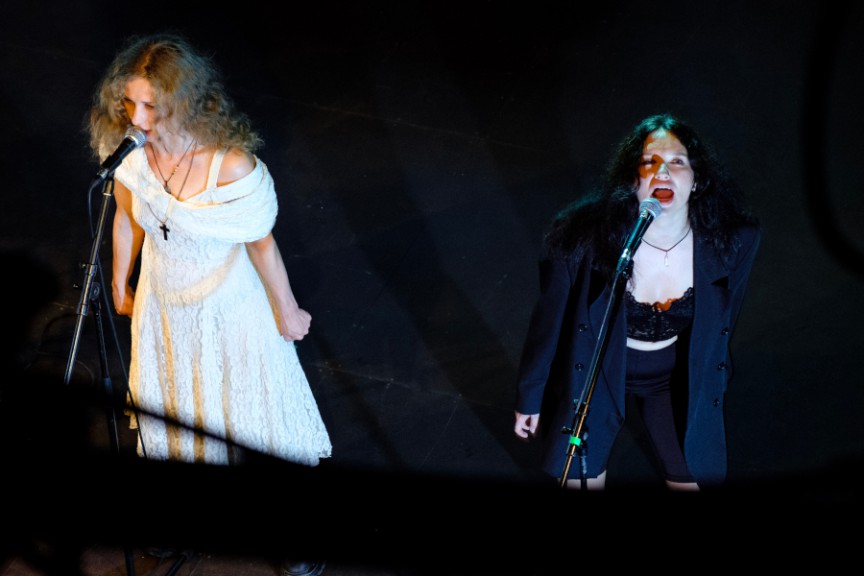
Save for Olga, all members of the band were dressed in white, which in Western culture often symbolizes purity, cleanliness, and truth. Alyokhina’s unwavering, insistent voice lends fluidity to a story otherwise broken up into clear chronological sections.
“I have to remember things in the proper order,” she writes in her book, “I need order.”
What fascinated me about Masha’s story was not only the hard-to-digest story itself but her ability to relay it to us with authenticity and conviction.
Even as she is still being hounded by the authorities. Most victims of trauma take years or even decades to find words to describe what happened to them. And yet, here she is, transforming it into a powerful multimedia assault on the senses. Its immediacy preserving potency and a liveliness that retrospect could never afford.
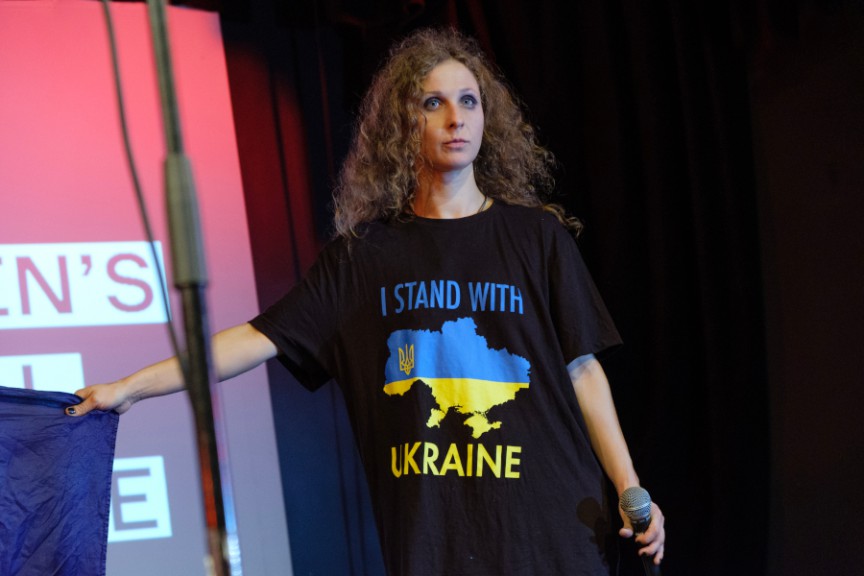
In the past, a story would be immortalized in that it was written down by, say, the brothers Grimm, or in being relayed by your grandmother. But in the age of self-promotion, there is a strange sense that Pussy Riot are immortalizing their own story, writing the Pussy Riot saga as it were.
By telling it in the form of performance art, a skewed paradigm develops where Masha’s reflection on her own story becomes the story itself.
Flute player Taso Pletner, who graduated from Moscow Art Theater Studio School in 2019, used her stage experience to engage the crowd. Appearing somewhat disinterested, yet knowing full well how her aloofness could fascinate the audience. Diana Burkot (Kot) hobbled onto the stage on crutches having recently broken her leg. This did not stop her from being the musical ballast of the group, playing both digital synthesizer and drums. Her vehement performance lifted her more than once to her good foot, the other propped up by a stool.
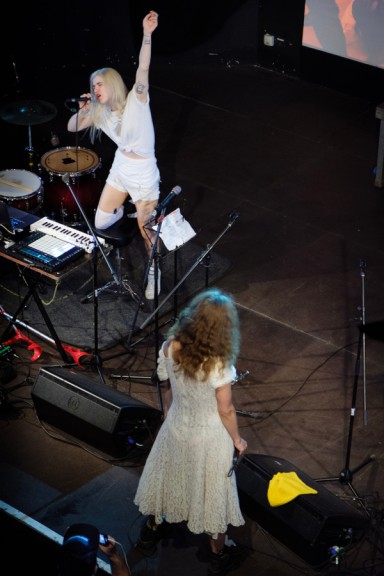
I observed a vulnerability in the women despite police presence outside. These women are political fugitives and yet seemed somehow more like girls. The fans, weird and wonderful, stood at their feet, laying out handmade peace flags which the girls lovingly received. Masha promised fans personal signatures on items of merchandise after the show, in order to raise money for the Okhmatdy Hospital hospital in Kyiv that they support. I had the distinct feeling that there were no boundaries protecting these idealistic mavericks. Or perhaps this was just the lack of personal autonomy they were used to?
The question that kept plaguing my mind was, is it all worth it?
Would they achieve their aim of inspiring the West to rise up and establish a complete embargo of Russian gas and oil in order to stop the war? Is it worth a child growing up without his mother? Four nomads with no place to rest their heads. Such complete and utter self-sacrifice to convey a noble cause to the minority who experience it.
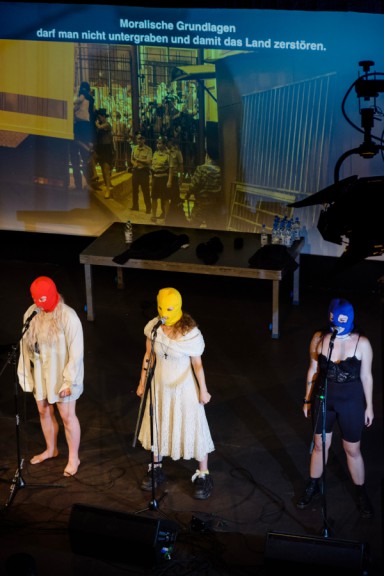
Perhaps Pussy Riot’s relocation from a state of dictatorship to the ‘free’ West has ignited their hope for change. However, I wonder if they overestimate the power of democracy and freedom of speech here in the West. We just need to look at the exhausted and disenchanted members of Fridays for Future to see how ineffective a ‘free’ voice can be when it is up against industry and power.
The German critical theorist, Theodor W. Adorno, defended art’s ability to shift social perspectives on issues of violence and justice, among others. Let’s not forget that we live today by universal values that philosophers and artists were exiled and shunned for two hundred years ago.
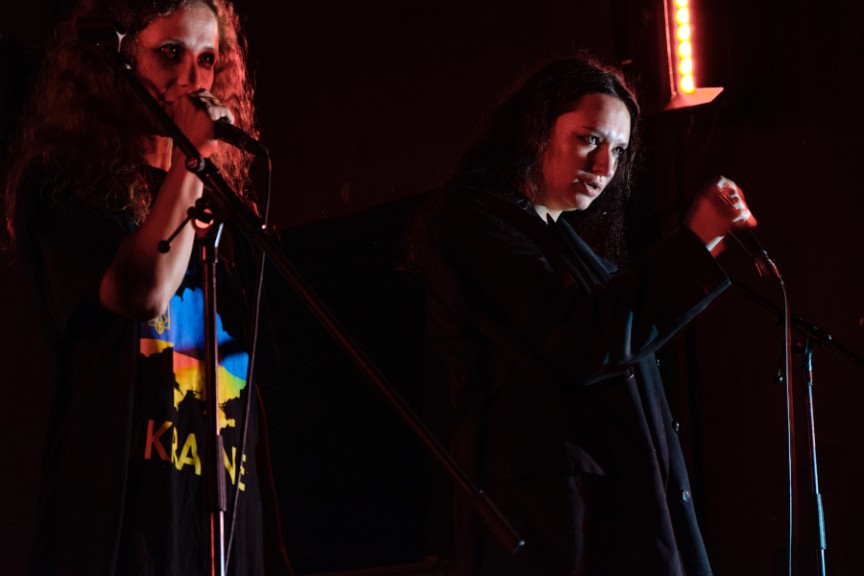
Perhaps the work of Pussy Riot is simply to say, “We are not a part of this, we stand with Ukraine… And we are Russian.”
The mind boggles to think about the number of Russian voices lying gagged and silent within those borders. Many of whom are behind bars.
“There is no such thing as a good Russian.” My Ukrainian friend tells me about this prevailing sentiment in her homeland as we sip our coffee in the safety of a German café. An illogical but understandable statement, all things considered. When I told her that I was going to the Pussy Riot concert she added, “Those girls are amazing.” Perhaps it only makes a small difference today. But Pussy Riot is leaving a trail of evidence that there was always opposition from the Russian people.
Unlike Masha, it may take both Russian and Western societies longer to process their trauma and lay it on the table of understanding. Perhaps Pussy Riot is just planting the seeds of a great big Siberian Forest that needs time to grow. Where there are no seeds there will be no trees. It is the seed and the conditions into which it is planted that define the way a tree grows.

